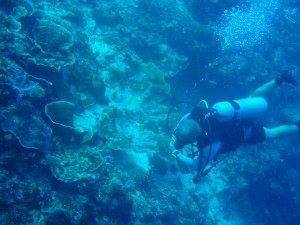Alternative Issue: Dive Tourism Threatens Marine Life
In the last two decades, the dive tourism industry has exploded into a global giant and has become a welcome source of income in less economically developed countries.
According to The Professional Association of Diving Instructors statistics, its membership numbers have increased by almost 70 per cent since 1993. Experts believe the main reason for the increase in dive tourism has been the influx of technology in recent years, bringing with it competitive flight prices and internet images of far flung shores waiting to be discovered. But recreational dive tourism is slowly sapping the life out of coral reefs worldwide.
Dr Sandra Brooke, research Scholar at Florida State University Marine Lab said: “Divers often stand on corals or touch them, or remove coral and other animals as artifacts. This is slowly damaging the ocean ecology in diving hotspots. If managed irresponsibly, tourism can badly impact coastal areas. ”
With growing concern over the preservation of marine and coral life, scientists are carrying out research to get to the bottom of what is going on under the surface of well- combed dive spots in areas such as Malaysia, The Middle East and Australia.
A study conducted by Kolej University in Malaysia found that 56 per cent of recreational divers made contact with coral reefs, and have named recreational diving as a factor contributing to reef and wildlife decline in the area.
Similarly, The Great Barrier Reef, one of the seven wonders of the world and the largest coral reef ecosystem in the world has halved in size over the last 27 years. The Australian Institute of Marine Science predicts that number is set to halve again by 2020, if irresponsible diving practice continues.
Despite the negative attention diving brings to areas of natural marine beauty, economic gains for countries blessed with popular dive spots can outweigh the negative impact. More than $23 billion AUDs are generated per year from tourism in North Eastern Australia, making it the area’s main source of revenue.
Dr Brooke said: “Tourism can cause a lot of damage from poor coastal management and the impact of recreational diving. However if done properly tourism can replace more destructive activities and can benefit local economies.”
By the same token, countries such as the Philippines experience wealth from a tourism industry linked to the diving on offer in areas that would otherwise remain unexplored. It offers impressive 40ft walls of coral, whale sharks and tropical fish to all who delve beneath its ocean surface.
Patrick Preston, dive centre owner in Palawan, Philippines said: “There is definitely a higher standard of living in Palawan, versus the surrounding areas. They have consistent and higher wages, and therefore more purchasing power. The downside is there also a higher impact on the dive and snorkel sites that over time will deteriorate if not properly managed.”
Although research about dive tourism is fairly new, experts agree that it can boost local economies and is positive, so long as tourists are educated and reefs are properly protected and maintained.


























